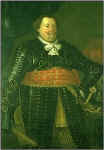Georg (George) of Calenberg
|
 |
Georg was the sixth of seven sons born to duke Wilhelm the Younger (1535-1592). In order to prevent a further division through inheritance in the new House of Lüneburg, the brothers agreed in 1611 to rule successively the undivided principality of Celle. At the same time it was to be decided by a drawing of lots who among them would be permitted to enter into a legal marriage. Georg won, so only his sons were expected one day to carry on the line of the new House of Lüneburg. In the Herzberg Castle am Harz, four sons, each with hereditary title, were born to Georg and his wife Anna Eleonore of Hessen - Darmstadt (1601-1659), whom he had married in 1617. But previously all the brothers of Georg had ruled successively in Celle.
Georg studied in Jena and was there able to be trained successfully as an officer. Repeatedly changing sides, Georg commanded Danish, imperial, and, from 1631, Swedish troops during the Thirty Years' War. In 1633 he was freed from the Habsburgs (imperial-Catholic occupation troops) due to a victory by Hessen - Oldendorf Lower Saxony. Shortly thereafter he assumed supreme command in the ruling sphere of Lower Saxony and took control of all Welf troops; with them he conquered the bishoprics of Hildesheim and Minden. Duke Friedrich Ulrich (1591-1634) of Brunswick - Wolfenbüttel, the last Welf sovereign from the Middle House of Brunswick, died in 1634 without heirs. A struggle for succession broke out within the Lüneburg dynasty. Only under pressure from the emperor did the Welf descendents from the Lüneburg line come to terms. On the strength of that, in 1635 Georg inherited the principality of Calenberg - Göttingen, which was separated from the principality of Brunswick - Wolfenbüttel and awarded to Lüneburg. In the same year, Georg's cousin, August the Younger (1579-1666), assumed power in Wolfenbüttel.
In 1636 Georg chose Hanover as his city of residence. With the consolidation of the central administration and standing army which were initiated by him, he laid the foundation for the upward development of his small principality. Duke Georg died in 1641 after a banquette in Hildesheim, most likely poisoned. He left behind four sons with hereditary title. In his will, Georg divided the Brunswick - Lüneburg inheritance into two duchies, Lüneburg - Celle and Lüneburg - Calenberg - Göttingen (Hanover). The eldest of his four sons, Christian Ludwig (1622-1665), ruled in Lüneburg - Calenberg from 1641 to 1648 and in Lüneburg - Celle from 1648-1665. When Christian Ludwig claimed the Duchy of Lüneburg - Celle after the death of his uncle Friedrich (1574-1648), the second eldest of Georg's four sons, Georg Wilhelm (1624-1705), received the Duchy of Lüneburg - Calenberg, which he ruled from 1648-1665. With the death of Christian Ludwig in 1665, Georg Wilhelm received Lüneburg - Celle, which he ruled until 1705, and the third eldest brother, Johann Friedrich (1625-1679), received Lüneburg - Calenberg, which he ruled until 1679. Upon the death of Johann Friedrich in 1679, the youngest brother, Ernst August (1629-1698), became duke of Lüneburg - Calenberg.
--Adapted from the website, Die Welfen
![]()
Sources
- The Encyclopaedia Britannica, 13th edition. New York: The Encyclopaedia Britannica, Inc., 1926.
- Katalog zur Landesgeschichte. Historisches Museum. Hanover, 1985.
- Judge, Harry, ed. Oxford Illustrated Encyclopedia. 3 vols. New York: Oxford University Press, 1988.
Web





